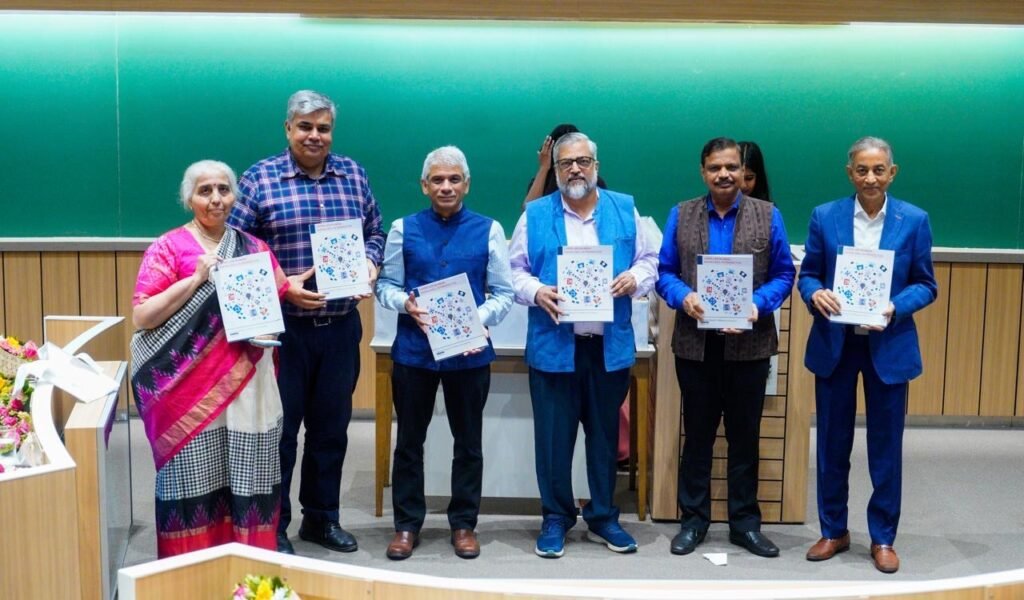
The Centre for Research in Wellbeing and Happiness (CRWBH) at FLAME University successfully hosted its 1st Annual Symposium on World Mental Health Day, bringing together experts to explore strategies for enhancing wellbeing across all life stages
India, October 10, 2025: The Centre for Research in Wellbeing and Happiness (CRWBH) at FLAME University, Pune, successfully hosted its 1st Annual Symposium on “Intervention Pathways to Wellbeing: Families, Communities, and the Lifecycle Approach” on October 10, 2025, in observance of World Mental Health Day. The landmark event brought together a distinguished panel of academicians, development practitioners, policymakers, industrialists, and domain experts to engage in insightful discussions on the evolving landscape of wellbeing and to explore innovative strategies for enhancing mental health and holistic wellbeing across all stages of life.
The welcome address of the symposium was delivered by Prof. Dishan Kamdar, Vice-Chancellor, FLAME University, followed by the inaugural address, which was given by Mr. Vallabh Bhanshali, Member, Governing Body, FLAME University. The opening remarks were made by Prof. Prasad Pathak, Dean – Research, FLAME University, and the keynote address was given by Prof. S.V. Subramanian, Professor, Harvard University.
FLAME University’s Centre for Research in Wellbeing and Happiness (CRWBH) is dedicated to advancing interdisciplinary research on societal wellbeing, integrating subjective and objective dimensions to address challenges within the Indian context. The Centre conducts academic and policy research, exploring emerging paradigms that go beyond conventional socioeconomic metrics. The objective of the 1st Annual Symposium on ‘Intervention Pathways to Wellbeing: Families, Communities, and the Lifecycle Approach’ was aligned with this mission and facilitated rich exchanges on evidence-based approaches to advancing wellbeing across familial, community, and societal contexts.
The event featured a thought-provoking plenary session on“Mental Health in Context: Families, Communities, and Social Structures” and an engaging panel discussion on “A Lifecycle Approach to Wellbeing: Intervention Pathways.” The plenary session, chaired by Prof. Udaya Shankar Mishra, Professor, International Institute for Population Sciences, and co-chaired by Prof. Tannistha Samanta, Faculty of Sociology, FLAME University, examined the far-reaching effects of shifting interpersonal relationships on psychological well-being across age groups, with a particular emphasis on young people. The discussion brought to light the growing challenges posed by fragmented family structures, the pervasive influence of social media and technology, mounting work-life imbalances, and the pace of modern living that leaves little room for reflection or emotional connection. The session underscored the restorative power of family bonds, community engagement, and social support systems in nurturing mental resilience.
Through this dialogue, participants gained deeper insights into India’s evolving mental health landscape and ongoing research efforts dedicated to fostering holistic wellbeing and happiness. Dr. Anuradha Sovani, Professor and Head, Department of Psychology, SNDT Women’s University, shared insights from a biopsychosocial framework linking individual, community, and societal factors to mental health outcomes, while Dr. Azizuddin Khan, Professor, Humanities and Social Sciences, IIT Bombay, highlighted evolving family structures and their implications for wellbeing.
The panel discussion drew on CRWBH’s formative assessment of elderly wellbeing in the Indian context. It explored pathways for ground-level interventions to enhance societal wellbeing through a life-cycle lens, reflecting on the complex interplay between objective and subjective measures of wellbeing across different phases of life. Experts deliberated on the feasibility of community-based initiatives that promote volunteering, neighborhood engagement, and altruism among the elderly as potential pathways to strengthen purpose, connection, and self-perceived well-being.
The discussion also examined scalable intervention models and their policy relevance, identifying strategies that can be implemented at a population level to promote a more inclusive and resilient society. Panelists included Prof. S.V. Subramanian, Professor, Harvard University; Prof. T.V. Sekher, Professor, International Institute for Population Sciences; Dr. Nidhi Gupta, Head of Research, Aditya Birla Centre for Enriching Lives; and Prof. Sunil Rajpal, Director, Centre for Research in Wellbeing and Happiness and Faculty of Economics, FLAME University, with Dr. Rajiv Kumar, Founder, Pahle India Foundation and Former Vice-Chairman, NITI Aayog, chairing alongside Dr. Tulika Tripathi, Associate Professor, Central University of Gujarat.
A highlight of the symposium was the release of CRWBH’s first flagship policy report titled Later Life in India: Ageing Well in Perspective, which provides a comprehensive assessment of elderly wellbeing in India. The report examines key dimensions including health, economic security, family care, and subjective wellbeing, while highlighting urgent policy priorities such as addressing the “double burden” of non-communicable diseases and mental health challenges, enhancing financial security and pension coverage, particularly for women, supporting family caregivers through formal long-term care, and promoting community-led, lifecycle-based interventions.
Speaking at the symposium, Mr. Vallabh Bhanshali said, “As educators, we must move beyond conventional measures like GDP and question what truly defines progress. Interdisciplinary education, at its core, is about freedom of thought and the courage to imagine new possibilities. If academic institutions can define missions, let ours be to create a happier world — not through vague ideals, but through measurable, meaningful impact.”
Also sharing his insights was Prof. Dishan Kamdar, who emphasized, “As a young centre, we have already brought together scholars from across the world to advance research on happiness and wellbeing. While India stands as the world’s fifth-largest economy, we rank 126th on the World Happiness Index — a reminder that progress cannot be measured by GDP alone. True success in academia and in society lies not in profit or publication, but in purpose and impact. At FLAME, we aim to redefine growth through inclusion, empathy, and the science of happiness.”
Dr. Anuradha Sovani, also added her unique perspective and shared, “Wellbeing is not merely the absence of illness, but the presence of connection — with ourselves, our families, our communities, and our society. As the world changes, many nurturing traditions have disappeared, but we can reclaim happiness through empathy, inclusion, and collective action. Mental health must become as accessible and indispensable as technology — a tool for everyone, everywhere.”
Further sharing his thoughts was Prof. S. V. Subramaniam, who said, “Happiness cannot simply be measured — it must be understood through its many components like connection, purpose, and environment. Just as GDP has clarity, our measures of wellbeing must be equally clear and inclusive. Faith, culture, and community spaces — from friendships to green parks — are as vital to our happiness as any economic indicator.”
Sharing insights from the landmark report, Prof. Sunil Rajpal stated, “Around 26–28% of elderly men and 30–35% of elderly women in India experience elevated depressive symptoms, with rates highest in central and conflict-affected states, highlighting how ageing, social isolation, and instability shape mental wellbeing.” He further added, “This underscores that mental wellbeing in later life is not solely a function of age or biology but is deeply intertwined with macro-level social and political stability. Chronic trauma and social disruption from conflict and instability represent profound, often unaddressed determinants of mental health, a pattern supported by research linking adverse early-life and environmental factors to poor outcomes in later life. The symposium aimed to explore evidence-based solutions and innovative intervention pathways to enhance mental health and overall wellbeing, focusing on families, communities, and lifecycle approaches that foster resilience, social cohesion, and purpose among India’s aging and young population.”
The symposium celebrated one year of CRWBH, showcasing its contributions to interdisciplinary wellbeing research in India. Over the past year, the Centre has undertaken research spanning psychology, public health, economics, and sociology, generating actionable insights for policy, community initiatives, and individual-level interventions. The event reinforced CRWBH’s position as a thought leader in promoting evidence-based strategies for mental health and holistic wellbeing. It concluded with an interactive open-floor session for participants to share reflections, questions, and recommendations, followed by a vote of thanks by Prof. Sunil Rajpal. The symposium successfully underscored the importance of lifecycle-based, community-driven approaches to wellbeing, fostering collaboration across sectors and inspiring future interventions to enhance health, happiness, and social cohesion at every stage of life.
About FLAME University
FLAME University is the pioneer of interdisciplinary education in India. It is driven to be one of India’s most respected and reputed centers of learning—the premier destination of choice for higher education in the nation for learners and teachers—to push the design and nature of studies and to create a societal up-gradation phenomenon, particularly in the fields of interdisciplinary education and leadership. FLAME has been set up with an idealistic vision and a social commitment to contribute to society nobly. With more than 180 quality full-time faculty members, the university offers an unparalleled educational experience. The student-teacher ratio is 15:1, unmatched at the higher education level in India. Spread on 70 acres of green expanse with aesthetically designed infrastructure, the campus currently consists of five faculties: Faculty of Liberal Education, Faculty of Business, Faculty of Communication, Faculty of Computing and Data Sciences, and Faculty of Design, Art & Performance. FLAME University has been established as a state-private university vide the FLAME University Act 2014 (Maharashtra Act No. II of 2015), now Maharashtra Private Universities (Establishment and Regulation) Act, 2023 (Maharashtra Act No. VIII of 2024) of the Government of Maharashtra. It is recognized by the University Grants Commission (UGC) under Section 2(f), and degrees awarded by the university are recognized under Section 22 of the UGC Act, 1956. FLAME University has been awarded the highest NAAC accreditation, A++.

Comments are closed.